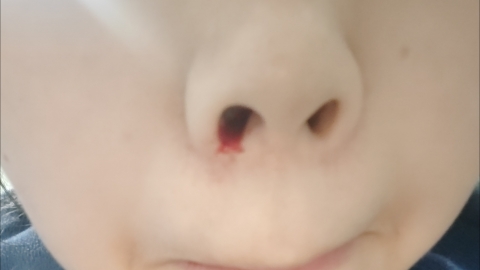What causes nosebleeds for no reason, and what should be done?
Generally, unexplained nosebleeds may be caused by factors such as dry air leading to mucosal damage, habitual nose picking injuring the nasal mucosa, allergic rhinitis, vestibular rhinitis, hypertension, and others. It is recommended to seek timely medical attention, identify the underlying cause, and improve the condition through general treatment and medication under a doctor's guidance. A detailed analysis is as follows:

1. Dry air causing mucosal damage: Prolonged exposure to dry environments can cause excessive moisture loss from the nasal mucosa, making it fragile and prone to rupture, thus causing nosebleeds. This is especially common during autumn and winter. Using a humidifier to maintain indoor humidity between 50% and 60%, using normal saline nasal spray daily to moisturize the nasal cavity, avoiding staying in environments with direct air conditioning or heating for long periods, and reducing mucosal dryness and damage are recommended.
2. Nasal mucosa damage due to habitual nose picking: Frequent manual nose picking or forceful nose-blowing can directly damage the nasal mucosa and capillaries, resulting in nosebleeds. It is important to immediately correct the habit of picking the nose or blowing forcefully. When experiencing a nosebleed, slightly lean forward and apply pressure to the nostrils to stop the bleeding. Applying medical petroleum jelly ointment regularly can help protect the nasal mucosa and reduce the risk of injury.
3. Allergic rhinitis: After exposure to allergens such as pollen or dust mites, the nasal mucosa becomes congested and swollen. The inflamed mucosa is prone to rupture and bleeding, often accompanied by nasal itching and sneezing. Patients should use medications such as budesonide nasal spray, cetirizine hydrochloride tablets, and loratadine capsules as directed by a physician to relieve allergic symptoms.
4. Vestibular rhinitis: Long-term irritation from nasal secretions can cause inflammation of the nasal vestibule skin. This inflammation leads to local mucosal congestion and erosion, making nosebleeds more likely, often accompanied by pain in the nasal vestibule. Patients should apply medications such as erythromycin ointment, mupirocin ointment, or fusidic acid cream to the affected area as directed by a physician.
5. Hypertension: When blood pressure rises suddenly, the blood vessels in the nasal cavity experience increased pressure and are more likely to rupture and bleed, often occurring during emotional excitement or upon waking in the morning. Patients should take medications such as nifedipine sustained-release tablets, amlodipine besylate tablets, and valsartan capsules as directed by a physician to control blood pressure.
In daily life, it is important to drink plenty of water to maintain adequate hydration, follow a light diet, and reduce the intake of spicy and irritating foods. Avoid strenuous exercise to prevent fluctuations in blood pressure that may cause nosebleeds. Additionally, proper nasal care should be practiced to avoid external irritation. Comprehensive lifestyle adjustments can help reduce the frequency of nosebleeds and maintain nasal health.







